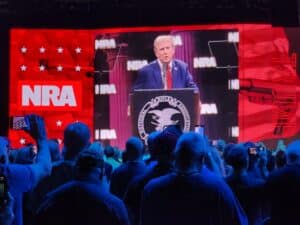The terms President Joe Biden’s son would have to accept in order to finalize his deal with federal prosecutors over a felony gun charge were revealed on Wednesday.
A copy of the diversion agreement signed by Hunter Biden’s lawyers and Department of Justice (DOJ) officials, but not yet accepted by a federal judge, was published by Politico shortly after the deal hit a snag in a Delaware federal courtroom. The agreement lays out what the younger Biden appears ready to stipulate to avoid jail time over the illegal possession charge. It also explains the conditions he must meet to avoid further punishments after the two-year diversion period.
“Biden shall waive indictment in relation to the information filed in the United States District Court for the District of Delaware on June 20, 2023, which charges Biden with one count of knowingly possessing a firearm while then an unlawful user of or person addicted to a controlled substance, in violation of Title 18, United States Code, Sections 922(g)(3) and 924(a)(2) (2018),” the proposed agreement said. “The United States agrees that if Biden complies with all of his respective obligations under the agreement, then the United States, within thirty (30) days after the expiration of the Diversion Period, will file a motion with the Court seeking the dismissal of the Information.”
The document’s publication provides further insight into the deal the younger Biden struck with prosecutors to avoid jail time over his admitted history of drug use, gun ownership, and alleged tax crimes. While the DOJ previously outlined the basic shape of the deal in a letter to U.S. District Judge Maryellen Noreika, this is the public’s first look at the specifics of the proposed agreement. The new document confirms that Hunter will have to stay clean during the duration of the deal and forfeit his gun rights for the rest of his life to avoid incarceration over the gun charge.
“It is understood that under the terms of this Agreement, Biden shall: a. Not purchase, possess, or attempt to purchase or possess, or otherwise come into possession of, a firearm (as that term is defined by Title 18, United States Code, Section 921(a)(3) or ammunition (as that term is defined by: Title 18, United States Code, Section 921(@)(17), during the Diversion Period or anytime thereafter,” the deal reads. “b. Consent to a permanent entry in the National Instant Criminal Background Check System (‘NICS’), such that he will be denied via NICS if he attempts to legally purchase another firearm.”
He would also be required to surrender any guns he currently owns, including the firearm that sparked the criminal inquiry.
“c. Pursuant to 18 U.S.C. § 924(d), forfeit to the United States all right, title, and interest in all firearms and ammunition involved in the charge set forth in the Information, including but not limited to a Colt Cobra 38SPL revolver with serial number RA 661363 (the “Subject Property”),” the agreement said. “The defendant agrees to waive any and all interest in the Subject Property in any administrative or judicial proceeding, whether civil or criminal, state or federal, and the defendant shall not file a claim or petition seeking remission or contesting the forfeiture of the Subject Property in any administrative or judicial proceeding, whether civil or criminal, state or federal.”
The diversion agreement also featured a set of facts that Hunter would have to admit to. The one-page summary described his history of using cocaine and failed rehabilitation efforts between 2016 and 2019. It appeared to reference Hunter’s 2021 memoir “Beautiful Things,” which detailed his drug use during the period he owned his firearm. Biden spent that spring promoting the autobiography even as he was coming under increasing scrutiny over his gun purchase after his former-sister-in-law and then-girlfriend found the handgun and, fearing for his safety, threw it in a dumpster behind a Delaware grocery store where it was later recovered and turned over to local police.
“Biden moved to California on reser moved to California in the spring of 2018, where he used crack cocaine on a regular basis, at times as frequently as every 15 minutes,” the agreement reads.
The agreement would require Hunter to admit that he owned his gun despite being addicted to drugs, admitting he broke federal law.
“Biden possessed the Firearm from October 12-28, 2018,” the deal reads. “During that time, he purchased and used crack cocaine regularly. On October 23, 2018, the Firearm was found in Biden’s vehicle along with drug remnants and paraphernalia.”
Professor Dru Stevenson, who has studied the practical application of drug-user-in-possession charges at the South Texas College of Law, said the possession charge Hunter faces is rarely enforced on its own. He estimated there were only about 200 convictions a year where that’s the only charge.
“As a general matter, it is extraordinarily rare to see cases where 922(g)3 is brought as a standalone charge – the circumstances of the arrest that led to the charge typically involve a drug bust or drug-related violence, so it is one of several charges in the case,” Stevenson told The Reload in June.
But the charge has been used as a standalone in a handful of recent cases that have garnered national attention. Jared Michael Harrison was prosecuted in federal court for possessing a gun while being a user of marijuana after both were found in his car during a traffic stop in May 2022. U.S. District Judge Patrick Wyrick found the federal prohibition violated the Second Amendment in a February 2023 ruling. U.S. District Judge Kathleen Cardone threw out a similar case against Paola Connelly a month later.
Even though the diversion agreement only involves a potential charge over Hunter’s possession of the firearm while he was using crack cocaine, it also requires him to admit that he lied on the background check form in order to buy the gun in the first place.
“When he purchased the Firearm, Biden completed an ATF Form 4473, which required him to answer the question, ‘Are you an unlawful user of, or addicted to marijuana or any depressant, stimulant, narcotic drug, or any other controlled substance?’ Biden answered ‘no,’ even though he was a user of, and addicted to, crack cocaine at the time,” the deal said. “Biden certified that his ‘answers in Section A’ were ‘true, correct, and complete,’ and that he understood that a person who answers ‘yes’ to that question is ‘prohibited from purchasing or receiving a firearm.'”
Ken White, a former federal prosecutor and current co-host of the legal podcast Serious Trouble, told The Reload it wasn’t surprising prosecutors picked the possession charge but not the background check crime. He said it is both easier to prove the possession charge and would result in the same punishment regardless.
“It’s kind of the same group of facts,” White said. “An aggressive prosecutor could charge both the gun and the false statement as a generic false statement and as a gun false statement. But that wouldn’t have an impact on the sentence. I think it represents more him taking responsibility for the full run of wrongdoing in connection with this issue. It’s routine to have a factual statement that includes stuff that’s not charged but part of the course of conduct.”
Still, Hunter’s plea deal has created high-profile political problems for his father. Former President Donald Trump, who is facing his own federal prosecutions but is leading in the race to take on Biden in 2024, has accused him of giving Hunter special treatment. And many other Republicans and gun-rights groups have criticized the deal as being soft on gun crime despite Biden’s staunch support for imposing stricter gun laws.
However, the deal’s failure could cause even more. The New York Times reported in May that Hunter’s legal team has threatened to use a Second Amendment defense if the DOJ moves forward with gun charges. Several criminal defendants charged with similar possession crimes have won by challenging the constitutionality of the underlying law under the new standard set by the Supreme Court in 2022’s New York State Rifle and Pistol Association v. Bruen. Should it come to that, the case would set up a high-stakes showdown between the President and his son on how far Second Amendment protections extend–potentially running concurrently with Biden’s re-election campaign.
Despite both sides signing on to the gun deal, which was paired with two tax-related charges, their agreement quickly broke down under questioning from Judge Noreika. When she asked each side about their understanding of whether the deal covered other crimes associated with Hunter’s business dealings during the covered time period, the sides were reportedly not on the same page. That turned the plea hearing, usually a short and sleepy affair, into headline news as the judge questioned the constitutionality of the gun law Hunter was charged under, and the two sides spared over how broad the protections guaranteed in the deal really were–with Biden’s lawyers threatened at one point to rip up the whole agreement.
After the judge gave them some time to speak, the two parties appeared to get back on the same page–or somewhere close to it. But the day ended with Hunter pleading not guilty to the two tax charges, leaving the deal in limbo.
“The bottom line is that the structure of the deal was convoluted and poorly thought out, and the connection between the two is weirdly done,” White said.
The parties now have a month to file briefs with Judge Noreika explaining why the deal is appropriate and constitutional.







Only Members can view comments. Become a member today to join the conversation.